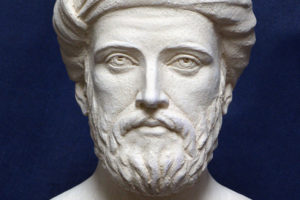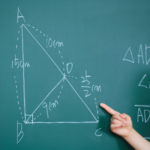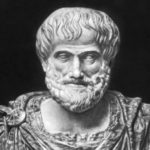25 interesting facts about Pythagoras
 The famous scientist Pythagoras laid the foundations of many scientific theories. Being an incredibly gifted person, he was well versed in a variety of sciences. His authority was so great that a real cult of personality was formed around him, and the Pythagoreans revered their leader for an almost divine being. Many of them believed that Pythagoras really possesses supernatural powers.
The famous scientist Pythagoras laid the foundations of many scientific theories. Being an incredibly gifted person, he was well versed in a variety of sciences. His authority was so great that a real cult of personality was formed around him, and the Pythagoreans revered their leader for an almost divine being. Many of them believed that Pythagoras really possesses supernatural powers.
The great scientist believed in the transmigration of souls, and then claimed that it is impossible to eat meat, as animals can have human souls.
The followers of the teachings of Pythagoras believed that numbers can explain everything, even the structure of the universe.
Pythagoras himself claimed that he remembers some of his past reincarnations. In particular, he said that in one of his past incarnations he was a warrior who participated in the defense of Troy during the Trojan War.
Many students of Pythagoras believed that he was the son of one of the gods of Olympus.
The scientist was attributed the ability to speak with animals.
Pythagoras, as you know, made a huge contribution to the development of geometry. However, the fact that he excelled in a number of other sciences is less widely known.
And unlike many other ancient Greek scholars, Pythagoras did not write treatises, since he did not want to trust the sacraments of his teaching to books.
Music, too, was not alien to the great scientist. So, he masterfully played such a complex musical instrument as a lyre.
To this day, not a single written work of Pythagoras has been preserved.
One of the requirements for everyone who wanted to join the Pythagorean school was the rejection of all property.
One of the asteroids in our solar system was named after Pythagoras.
According to one old legend, Pythagoras did not invent his famous theorem on triangles himself, but he defeated another scientist, having dubbed him into a dispute. The loser gave him his scroll with the theorem.
One of the permanent items of the scientist’s wardrobe was a golden diadem, which he wore on his head.
According to another legend, Gippas, a pupil of Pythagoras, discovered the golden section, which disproved the teachings of Pythagoras, and the scientist killed him. But this is just a legend.
It is known for certain that Pythagoras is a nickname, not a name. But the true name given to the scientist at birth is still a mystery.
According to the statements of the ancient Greek philosopher Porfiry, Pythagoras died during one of the rebellions in the city of Samos, where he lived. However, he lived to an advanced age, to 80 or even to 90 – there are still debates on this subject.
The school of Pythagoras had three main directions – political, religious and philosophical.
popular legends claim that the very first lecture given by the scientist in public brought him about two thousand devoted followers who immediately left their families and joined his school.
For the first time, ancient historians became interested in the life of Pythagoras about 2 centuries after his death.
Pythagoras spent 22 years in Egypt, eagerly absorbing the knowledge of the ancient Egyptian sages. Before returning to Greece, he also visited Babylon, where he remained for another 12 years.
Pythagoras was the first to suggest that our planet has a spherical shape, and not flat.
The scientist’s parents were not educated people. His father, for example, was a mason.
Each number in the teachings of the Pythagoreans had its own sacred meaning. For example, “10” was considered the highest number, and the number “7” was associated with wisdom.
Pythagoras left his hometown at the age of 18, embarking on a long journey, drawn by a thirst for knowledge. Then he did not yet know that this journey would last more than 34 years.
Being a very physically strong man, Pythagoras of Samos won several prizes at the Olympic Games, competing in fist fights.



























